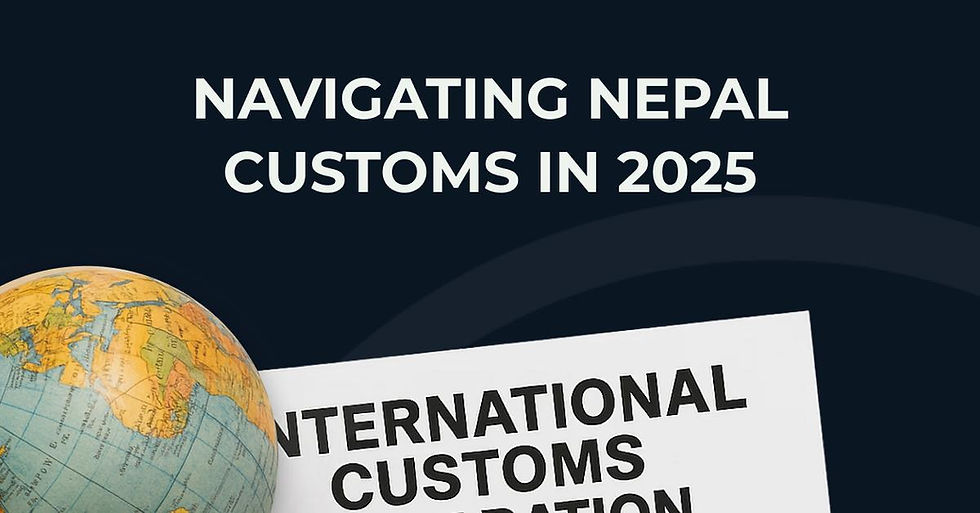How to Choose the Best Cold-Chain Logistics Services in Nepal
- sudev968
- Aug 25, 2025
- 4 min read

When it comes to industries like pharmaceuticals, fresh produce, dairy, meat, or even floriculture, the success of your business can depend heavily on the reliability of your cold-chain logistics partner.
In Nepal, the demand for temperature-controlled logistics services has been steadily increasing as more businesses rely on safe and efficient delivery of perishable goods across challenging terrains.
But with several providers offering different services, how do you know which one is the right fit? This guide will walk you through the essential factors to consider when choosing the best cold-chain logistics services in Nepal—from reliability and technology to compliance and cost.
Why Cold-Chain Logistics Matters in Nepal
Nepal’s unique geography, with high-altitude regions and diverse climates, makes transporting perishable goods particularly complex. The infrastructure is also still developing, and disruptions can occur due to weather, roadblocks, or customs processes.
For businesses handling food products, pharmaceuticals, or sensitive biological materials, choosing the right cold chain logistics company is not just about convenience—it’s about compliance, safety, and customer trust. A single breakdown in the temperature chain can mean financial loss, regulatory issues, and reputational damage.
Key Criteria for Choosing the Right Cold-Chain Logistics Service
Here are the factors every business should evaluate:
1. Temperature-Control Capabilities
The first and most critical factor is the provider’s ability to maintain precise temperatures throughout the journey. Different products require different temperature ranges:
Fresh produce: 0°C to 8°C
Frozen food: -18°C or below
Pharmaceuticals: 2°C to 8°C
Vaccines or biologics: strict, monitored ranges
Ask if the logistics partner offers refrigerated trucks, insulated containers, and climate-controlled storage facilities. Providers that can demonstrate proven consistency in these ranges should be shortlisted.
2. Compliance and Certifications
Global cold chain standards are rigorous. A professional logistics partner should comply with:
ISO standards for quality and safety
GDP (Good Distribution Practices) for pharmaceuticals
HACCP for food safety
Customs and quarantine regulations for imports/exports
Look for certifications and documented SOPs to ensure compliance. A partner without certifications may not provide the accountability your business needs.
3. Technology and Tracking
Modern cold chain logistics rely heavily on technology. Some questions to ask:
Do they provide real-time temperature and location monitoring?
Can you access shipment status through a dashboard or mobile app?
Are alerts triggered if temperatures deviate from the set range?
This transparency ensures you can respond quickly if an issue arises and demonstrates reliability to your customers.
4. Network and Coverage in Nepal
Cold-chain reliability depends on coverage. Check if the company has:
A wide network across Nepal’s major trade hubs (Kathmandu, Biratnagar, Birgunj, Pokhara, Nepalgunj).
Cross-border transport capabilities for goods moving to/from India, China, or overseas.
Strong relationships with customs officials and airport/port authorities for faster clearance.
Providers with established infrastructure across multiple regions will minimize delays and risks.
5. Experience and Industry Expertise
Not all logistics challenges are the same. A company that has moved fresh vegetables may not have the same expertise needed for biological samples or vaccines. Choose a partner with specific experience in your sector.
Examples:
For pharma: proven track record of GDP-compliant cold chain shipping.
For agriculture: expertise in minimizing spoilage during long transits.
For retail: managing distribution schedules to multiple outlets.
6. Flexibility and Scalability
Can the logistics provider adapt to your business needs as you grow? Some businesses need frequent small shipments, while others need bulk seasonal transport. The best providers offer scalable services—from one-off refrigerated deliveries to long-term contracts.
7. Value-Added Services
The best cold chain logistics companies don’t just move goods; they help businesses thrive. Look for:
Cold storage warehousing near major trade hubs
Packaging solutions to ensure insulation and reduce damage
Last-mile delivery for urban retail networks
Reverse logistics for returns
These extras often save time and reduce total costs in the long run.
8. Cost vs. Quality Balance
Cost is always a major factor. However, in cold chain logistics, the cheapest option may end up being the most expensive if shipments are delayed or spoiled.
A good practice is to request detailed quotes that break down:
Storage costs
Transportation fees
Customs clearance costs
Packaging expenses
Compare multiple providers, but weigh cost alongside track record, reliability, and service quality.
Comparison: Local vs. International Cold Chain Providers
When searching for the right partner, you may come across both local and international companies.
Local providers often have better regional expertise, understand Nepal’s infrastructure challenges, and may offer lower costs.
International providers typically bring advanced technology, global certifications, and wider networks.
For many businesses, a hybrid model—working with local partners who collaborate with global cold-chain networks—offers the best of both worlds.
Checklist for Choosing Your Cold Chain Logistics Partner
Here’s a simple checklist to guide your decision-making:
✅ Do they maintain the required temperature ranges consistently?
✅ Are they certified for food, pharma, or agriculture logistics?
✅ Can you track shipments in real time?
✅ Do they have reliable coverage across Nepal and international routes?
✅ Have they handled products like yours before?
✅ Do they offer flexible, scalable solutions?
✅ Are their costs transparent and justifiable?
If you can tick off most of these, you’ve likely found a strong partner.
Final Thoughts
Choosing the right cold chain logistics services in Nepal is about much more than moving goods—it’s about protecting your products, your customers, and your reputation. From refrigerated logistics companies to cold storage facilities and last-mile delivery, the right partner can make the difference between growth and loss.
At Orient Relocations, we specialize in temperature-controlled logistics designed for Nepal’s unique challenges. With certified handling, real-time tracking, and a network that spans major trade hubs, we help ensure your goods arrive safely and on time.
👉 Contact us today to discuss how we can support your cold-chain needs in Nepal.



Comments